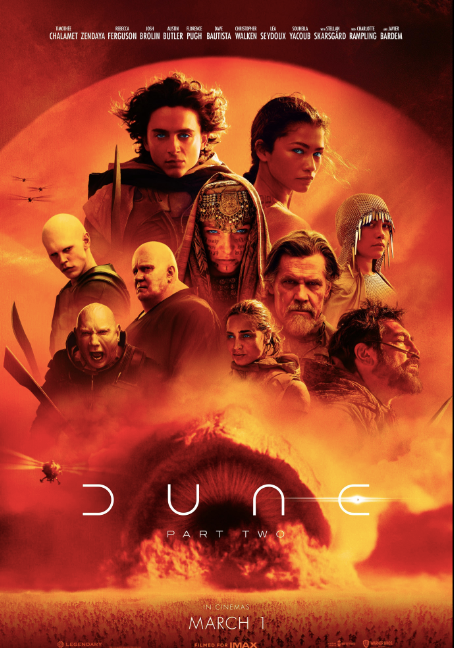
I'm beginning to think I'm bound to be disappointed seeing a science fiction trilogy I love brought to the screen. Those of you who have read my reviews of Foundation, and/or listened to my discussions of the Apple TV+ series on podcasts, will know my frustration with that TV series. In a sentence, the part that had nothing to do with the original trilogy, the Cleon clones, was the best, and the series lacked some of the strongest parts of the trilogy (or the extent of the trilogy that has so far appeared on the screen).
Ironically, I thought the first part of Denis Villeneuve's rendition of Dune was excellent on just about every level (here's my review). But the second part, which I just saw last night, indulged in major changes in major characters, and left others completely out.
[Spoilers ahead ... ]
Let's start with Chani. The love that she and Paul had for each other lit up the second half of Dune (Frank Herbert's original long novel). In the movie, she's annoyed or angry with Paul in just about every other scene of the two, including storming off and away at the end.
Alia, Paul's sister, an extraordinary character in the novel, with all kinds of powers derived from the spice she received in Jessica's womb, is seen in the movie only briefly as a young adult in a vision Paul has of the future. A child with such wisdom and power was a cardinal element of the novel. In the movie she's reduced to a voice that Jessica hears, presumably coming from the baby she's carrying.
And what happened to Thufir Hawat the Mentat? And the Space Guild? Their way of bending space with their minds actually received more attention in the Foundation TV series, though they indeed were extensively developed in the Dune novel.
Meanwhile, Feyd-Rautha had plenty of screen time, but I thought his character was reduced to a cartoonish cliche, complementing one Atreides opponent before he kills him, and Paul himself as Feyd-Rautha is about to die from Paul's superior knife-play. The actual fight, I'll admit, though, was excellent.
And while I'm on the subject of what was excellent in Dune Part 2, I thought Javier Bardem delivered in every scene as Stilgar, whose part was well-drawn in the movie, as did Florence Pugh as Princess Irulan, surprisingly relevant in the movie as in the novel. Indeed, all the acting was fine or better in Dune Part 2, as was the cinematography.
But I'll end with one more complaint: I don't know, but the scenes of Paul riding the sandworm just weren't as impressive as the scenes required. All too often, they looked to me as if Paul was riding some kind of undulating carpet made of sand (I was half expecting to hear Steppenwolf in the background).
In sum: see Dune Part 2 -- if only to prepare yourself for the third installment, which will bring Dune Messiah to the screen, which I hope will remedy some of the many problems in Dune Part 2.
See also: Dune, Part 1: Half the Movie, Twice the Power of Most Other Complete Films
No comments:
Post a Comment